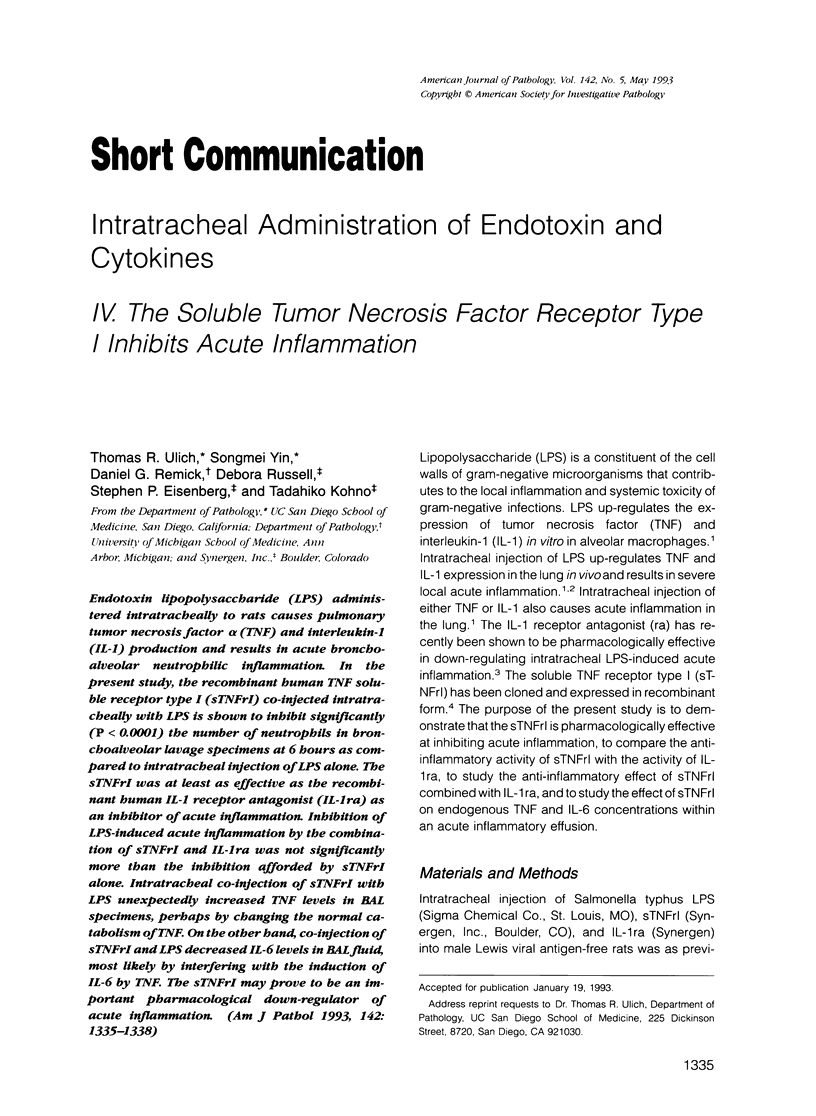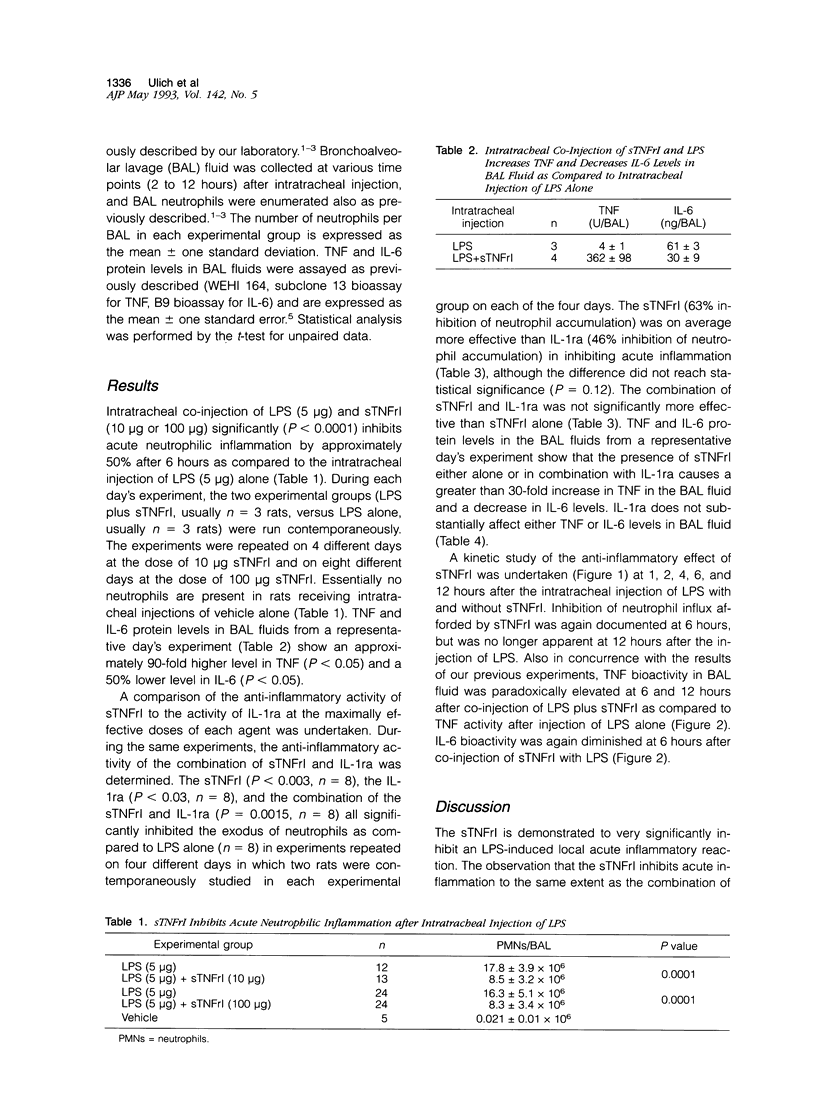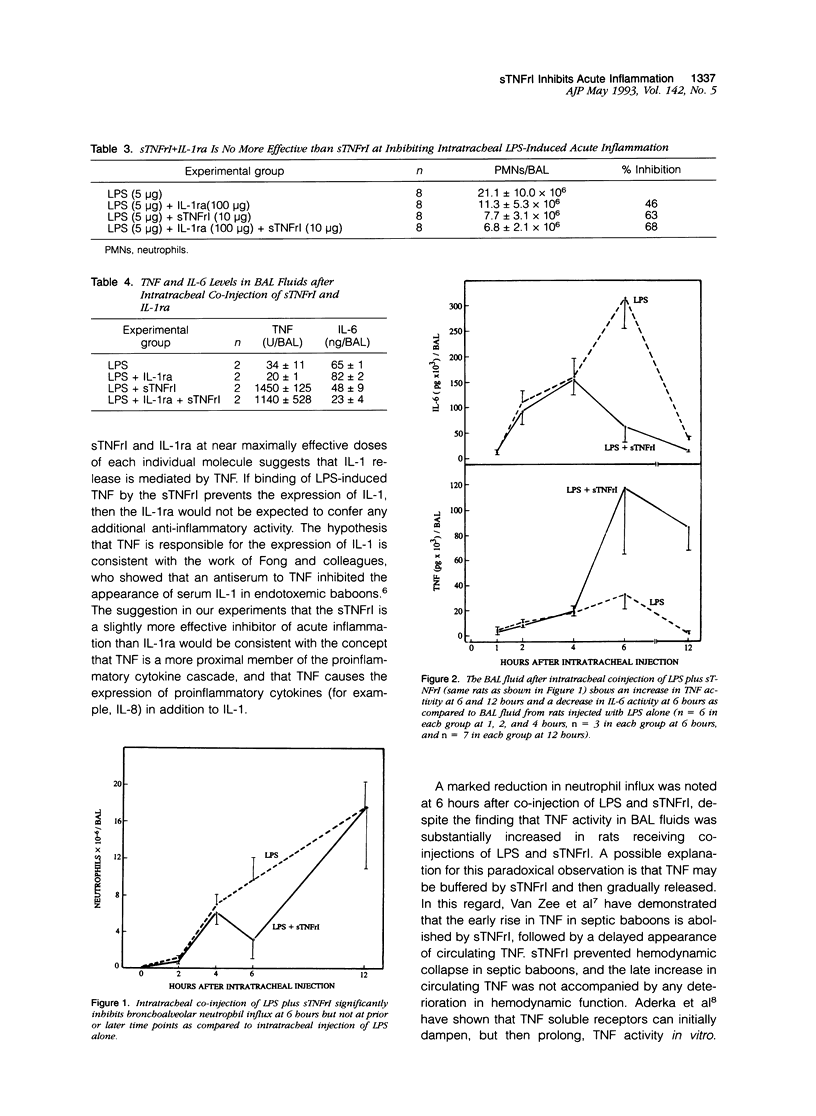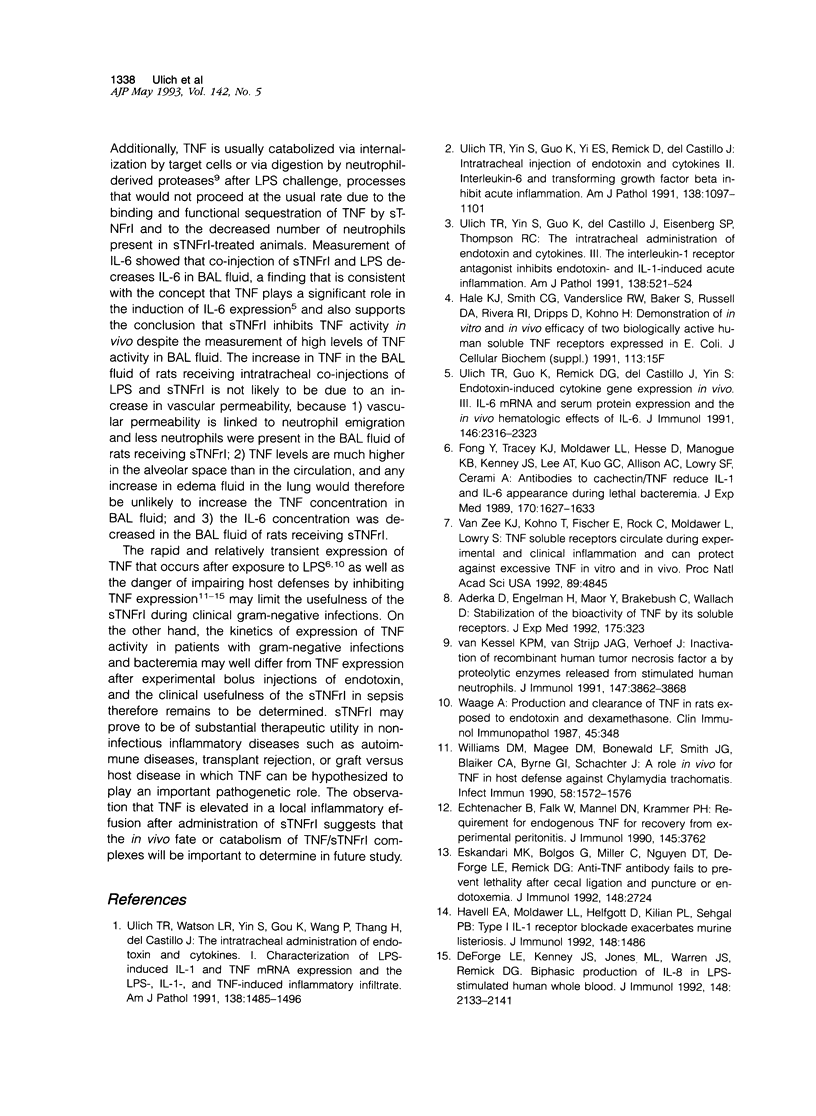Abstract
Endotoxin lipopolysaccharide (LPS) administered intratracheally to rats causes pulmonary tumor necrosis factor alpha (TNF) and interleukin-1 (IL-1) production and results in acute broncho-alveolar neutrophilic inflammation. In the present study, the recombinant human TNF soluble receptor type I (sTNFrI) co-injected intratracheally with LPS is shown to inhibit significantly (P < 0.0001) the number of neutrophils in bronchoalveolar lavage specimens at 6 hours as compared to intratracheal injection of LPS alone. The sTNFrI was at least as effective as the recombinant human IL-1 receptor antagonist (IL-1ra) as an inhibitor of acute inflammation. Inhibition of LPS-induced acute inflammation by the combination of sTNFrI and IL-1ra was not significantly more than the inhibition afforded by sTNFrI alone. Intratracheal co-injection of sTNFrI with LPS unexpectedly increased TNF levels in BAL specimens, perhaps by changing the normal catabolism of TNF. On the other hand, co-injection of sTNFrI and LPS decreased IL-6 levels in BAL fluid, most likely by interfering with the induction of IL-6 by TNF. The sTNFrI may prove to be an important pharmacological down-regulator of acute inflammation.
Full text
PDF



Selected References
These references are in PubMed. This may not be the complete list of references from this article.
- Aderka D., Engelmann H., Maor Y., Brakebusch C., Wallach D. Stabilization of the bioactivity of tumor necrosis factor by its soluble receptors. J Exp Med. 1992 Feb 1;175(2):323–329. doi: 10.1084/jem.175.2.323. [DOI] [PMC free article] [PubMed] [Google Scholar]
- DeForge L. E., Kenney J. S., Jones M. L., Warren J. S., Remick D. G. Biphasic production of IL-8 in lipopolysaccharide (LPS)-stimulated human whole blood. Separation of LPS- and cytokine-stimulated components using anti-tumor necrosis factor and anti-IL-1 antibodies. J Immunol. 1992 Apr 1;148(7):2133–2141. [PubMed] [Google Scholar]
- Echtenacher B., Falk W., Männel D. N., Krammer P. H. Requirement of endogenous tumor necrosis factor/cachectin for recovery from experimental peritonitis. J Immunol. 1990 Dec 1;145(11):3762–3766. [PubMed] [Google Scholar]
- Eskandari M. K., Bolgos G., Miller C., Nguyen D. T., DeForge L. E., Remick D. G. Anti-tumor necrosis factor antibody therapy fails to prevent lethality after cecal ligation and puncture or endotoxemia. J Immunol. 1992 May 1;148(9):2724–2730. [PubMed] [Google Scholar]
- Fong Y., Tracey K. J., Moldawer L. L., Hesse D. G., Manogue K. B., Kenney J. S., Lee A. T., Kuo G. C., Allison A. C., Lowry S. F. Antibodies to cachectin/tumor necrosis factor reduce interleukin 1 beta and interleukin 6 appearance during lethal bacteremia. J Exp Med. 1989 Nov 1;170(5):1627–1633. doi: 10.1084/jem.170.5.1627. [DOI] [PMC free article] [PubMed] [Google Scholar]
- Havell E. A., Moldawer L. L., Helfgott D., Kilian P. L., Sehgal P. B. Type I IL-1 receptor blockade exacerbates murine listeriosis. J Immunol. 1992 Mar 1;148(5):1486–1492. [PubMed] [Google Scholar]
- Ulich T. R., Guo K. Z., Remick D., del Castillo J., Yin S. M. Endotoxin-induced cytokine gene expression in vivo. III. IL-6 mRNA and serum protein expression and the in vivo hematologic effects of IL-6. J Immunol. 1991 Apr 1;146(7):2316–2323. [PubMed] [Google Scholar]
- Ulich T. R., Watson L. R., Yin S. M., Guo K. Z., Wang P., Thang H., del Castillo J. The intratracheal administration of endotoxin and cytokines. I. Characterization of LPS-induced IL-1 and TNF mRNA expression and the LPS-, IL-1-, and TNF-induced inflammatory infiltrate. Am J Pathol. 1991 Jun;138(6):1485–1496. [PMC free article] [PubMed] [Google Scholar]
- Ulich T. R., Yin S. M., Guo K. Z., del Castillo J., Eisenberg S. P., Thompson R. C. The intratracheal administration of endotoxin and cytokines. III. The interleukin-1 (IL-1) receptor antagonist inhibits endotoxin- and IL-1-induced acute inflammation. Am J Pathol. 1991 Mar;138(3):521–524. [PMC free article] [PubMed] [Google Scholar]
- Ulich T. R., Yin S., Guo K., Yi E. S., Remick D., del Castillo J. Intratracheal injection of endotoxin and cytokines. II. Interleukin-6 and transforming growth factor beta inhibit acute inflammation. Am J Pathol. 1991 May;138(5):1097–1101. [PMC free article] [PubMed] [Google Scholar]
- Van Zee K. J., Kohno T., Fischer E., Rock C. S., Moldawer L. L., Lowry S. F. Tumor necrosis factor soluble receptors circulate during experimental and clinical inflammation and can protect against excessive tumor necrosis factor alpha in vitro and in vivo. Proc Natl Acad Sci U S A. 1992 Jun 1;89(11):4845–4849. doi: 10.1073/pnas.89.11.4845. [DOI] [PMC free article] [PubMed] [Google Scholar]
- Waage A. Production and clearance of tumor necrosis factor in rats exposed to endotoxin and dexamethasone. Clin Immunol Immunopathol. 1987 Dec;45(3):348–355. doi: 10.1016/0090-1229(87)90087-0. [DOI] [PubMed] [Google Scholar]
- Williams D. M., Magee D. M., Bonewald L. F., Smith J. G., Bleicker C. A., Byrne G. I., Schachter J. A role in vivo for tumor necrosis factor alpha in host defense against Chlamydia trachomatis. Infect Immun. 1990 Jun;58(6):1572–1576. doi: 10.1128/iai.58.6.1572-1576.1990. [DOI] [PMC free article] [PubMed] [Google Scholar]
- van Kessel K. P., van Strijp J. A., Verhoef J. Inactivation of recombinant human tumor necrosis factor-alpha by proteolytic enzymes released from stimulated human neutrophils. J Immunol. 1991 Dec 1;147(11):3862–3868. [PubMed] [Google Scholar]


